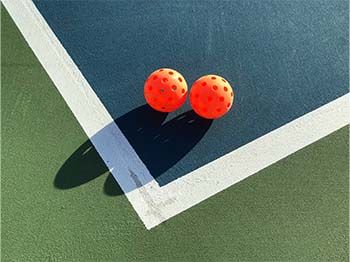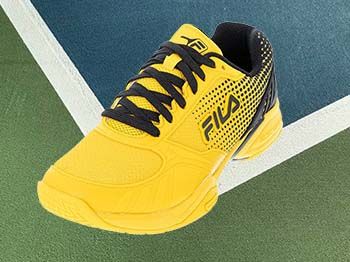Best Dog Breeds for Senior Citizens
Getting a dog as a pet is always a consideration which calls for some long-range thinking.
Getting a dog as a pet is always a consideration that calls for some long-range thinking. This is particularly true once we have lived long enough to be considered a senior in our 60s, 70s, 80s, or beyond. Many seniors live alone, and having a four-legged companion sounds like a good idea to alleviate a periodic sense of loneliness and isolation. Even if we live with a companion or roommate, pets can provide the same uplifting of our spirits. But those little critters need a fair amount of care from us. And they create issues in our homes that we would do well not to think about. Remember that cats can be left alone for a day or two with food and water, but not so with dogs. But cats are hard to take for a walk…
Well, Dear Reader, below, I’ve provided you with my thoughts about several dog breeds that we feel are suitable for boomers and seniors. There are, to be sure, many dozens more to choose from, but we’ve stuck with the ones best known to most of us. It is always worth considering having a dog in our lives as we get older, whether we live alone or with a spouse, partner or family. Choose carefully, after giving due thought to the responsibilities of having a dog. And should Fido or Fifi or Rex or King or Charlie the Chihuahua come into your life, live well and enjoy the company.
Best Dog Breeds for Seniors Ranking Chart
| Rank | Breed | Characteristics |
| #1 | Papillion | Hypoallergenic, Friendly, Small, Intelligent |
| #2 | Bloodhound | Mellow, Friendly, Short, Hunter |
| #3 | Greyhound | Tall, Mellow, Friendly, Fast, Hunter |
| #4 | Labrador | Energetic, Friendly, Shed Frequently, Require Exercise |
| #5 | Golden Retriever | Friendly, Hunters, Big, Require Exercise |
| #6 | Corgi | Small, Friendly, Shed Frequently |
| #7 | Pug | Small, Friendly, Require Little Exercise |
| #8 | Westie | Small, Hypoallergenic, Friendly, Intelligent, Hunter |
| #9 | Cairn Terrier | Small, Hypoallergenic, Friendly, Intelligent, Hunter |
| #10 | Beagle | Medium Size, Intelligent, Hunter, Require Exercise |
10. Beagle
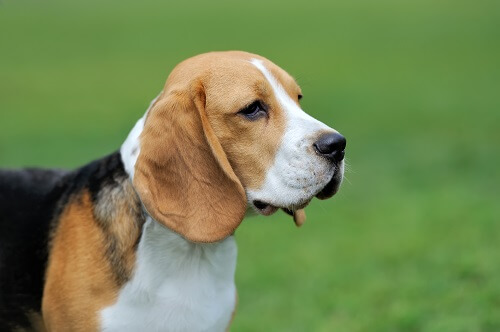
The beagle is a small hound that weighs between 14-18 pounds and stands about 12-14 inches tall at the shoulder. Beagles have short hair, and long, floppy ears set high on their head. They have short legs and deep chests with a tail that curls over their backside when they are excited or happy.
They often do not get along well with other house pets, so ask your cat before getting one. Beagles are a breed of hunting dog, so they require daily exercise and room to explore in your home or backyard. Also, beagles are very loving dogs who want to please their owners at all times, but they can also be stubborn if they don’t get what they want or need. We recommend beagles as a pet for seniors looking for a small dog breed that requires a lot of walks. These little furballs will force you to get out of the house and receive some much-needed vitamin D - great for building immune system support.
9. Cairn Terrier
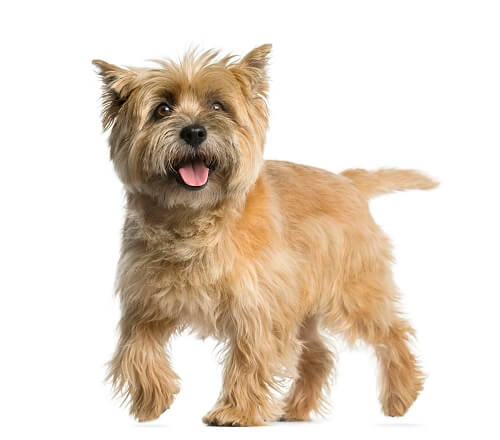
Cairn Terriers are an intelligent and loveable breed of small dog. They have long hair which requires daily brushing, lest it get matted and the dog be mistaken for a Rastafarian.
The Cairn Terrier was originally bred in the 19th century in Scotland to be used for hunting foxes, badgers, otters, and other small game. It was also used as a farm dog to keep rodents away from crops. Since they were bred to be hunting dogs, one must be careful since they tend to want to chase small animals. Even a small dog, lunging after a squirrel to chase, can pull an unsteady senior over.
If you are a senior who loves gardening and has a small yard, then we recommend a Cairn Terrier. These adorable pups will keep rodents away from your home and bunnies out of your lettuce patch. We believe the Cairn Terrier is are a perfect companion dog for seniors and boomers.
8. West Highland White Terrier
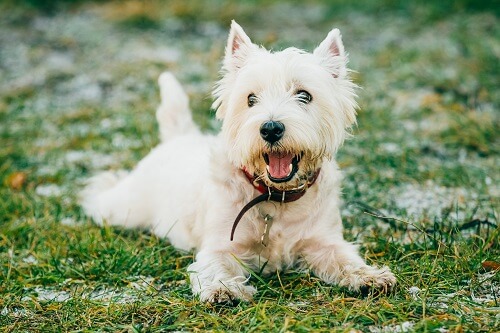
West Highland White Terriers, also known as Westies, are small terriers with big personalities. They have a white coat with black, brown, or tan markings on their head and tail. They are also known for their thick, curly coat that is weather resistant to some degree. The Westie has a long muzzle, almond-shaped eyes, and erect ears that stand up straight. These beautiful white pups are easy to train and are eager to please their owner.
Super friendly by nature, these cute dogs are outstanding with other dogs and kids. They are loyal companions you can leave around the grandkids without worrying about either. In fact, we rank Westies as the number one dog on our list for seniors with grandchildren. A bonus is Westies require minimal grooming, as they are hypoallergenic.
7. Pug
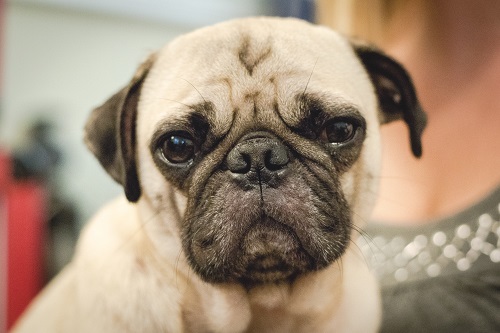
These small dogs have faces that bring-to-mind Winston Churchill, at least in my mind. I can almost hear them bark with a British accent. However, Pugs are not British by origin but native to a completely different continent. These funny-looking pups have been around for over 400 years and were originally bred in China. They were brought to Europe by Dutch traders in the 1600s. The breed became popular in France, where they were called "Dutch Pugs."
Pugs are short-haired dogs, which makes it easy to keep them groomed. They do not call for much exercise, though a Pug that does not get out and about enough will tend to get very overweight. They are friendly dogs and charming critters for people to interact with in public.
We recommend pugs for seniors who do not want the hassle of walking a dog regularly. Make sure to feed your pug the correct dog food (recommended by your vet) because they tend to have upset stomachs and allergies. Your grandchildren will love playing with these funny pups! We consider Pugs one of our top lap dog breeds for seniors.
6. Corgi
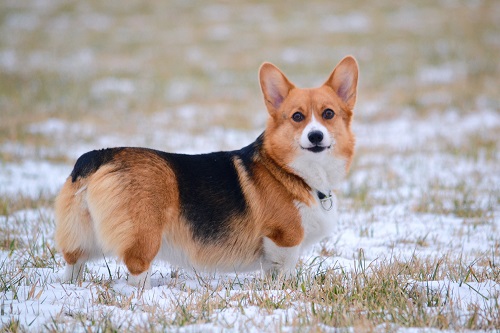
Corgis are popular and very expensive to purchase! Corgis are a herding breed known for their intelligence and athleticism. They were originally bred in the Welsh mountains to herd cattle and sheep. The name "corgi" is derived from the Welsh word for dog, "cawr." The corgi's ancestors may include the Pembroke Welsh Corgi, the Dachshund, and possibly some terrier breeds.
Corgis are fantastic house or apartment pets and are exceptional with children. Corgis need a lot of exercise and tend to bark a lot when left alone. Without daily exercise, they put on weight quite fast. They also shed their hair at least twice a month, so be prepared to do the cleaning in your home.
5. Golden Retriever
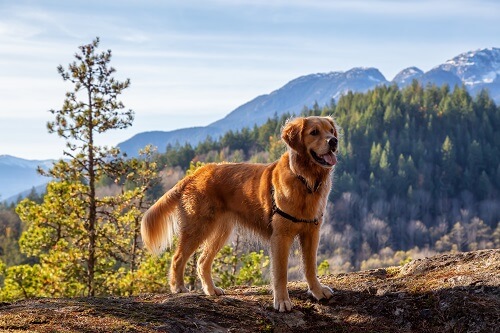
Golden retrieves are probably the most popular breed of dog in America and for good reason. They are friendly, smart, and as loyal as the day is long.
Golden Retrievers are large dogs that require a lot of exercise. Males typically weighing 60-75 pounds and females 50-65 pounds, so these dogs do get quite large, which is something to consider for seniors. Golden retrievers were originally bred as hunting dogs for retrieving game such as waterfowl, upland game birds, and deer. Their intelligence was also used to help guide people with disabilities.
If you are looking to keep motivated in your own fitness and o for a healthy jaunt once or twice a day, Goldens would be a good match for you. They also shed quite a bit, so be ready to do some extra house cleaning. Goldens are also sweet by nature so you don’t have to worry leaving your grandchildren with them. We believe the Golden Retriever is the ideal companion dog for senior who love daily walks, hiking, and adventures.
4. Labrador Retriever
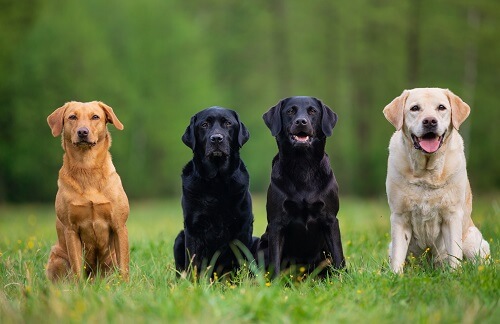
Black Labs, Golden Labs, Brown Labs, White Labs – all are excellent dogs for any age of the owner. For seniors, they can be one of the best breeds in that they are loyal, friendly, and eager to provide company. This is another breed of dog useful for boomers or seniors desiring both companionship and exercise.
Labradors were originally bred to help fishermen by retrieving lines and nets, and they have been used as a gun dog since the 1800s. These days they are popular pets because they are so affectionate and playful! Labradors are also easy to train and are eager to please their owners.
Labs are congenial and easy for a stranger to pet while you are engaged in conversation out on a walk. These dogs do shed quite a bit and require a lot of activity. At home, however, they are pretty content to lie around in the same room as their owner or family. They are big dogs, so take this under advisement if the owner is frail and unsteady on their feet, particularly while walking the pooch outside.
3. Greyhound
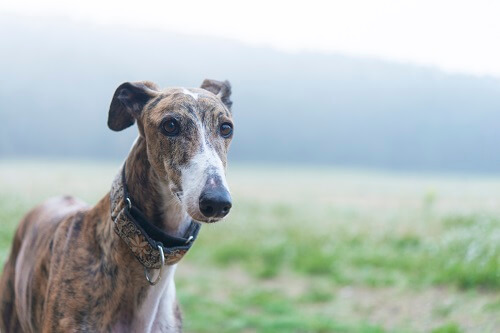
Greyhounds are best known as racing dogs. In fact, Greyhounds are actually the fastest domesticated animal in the world. They are tall and often quite heavy, up to 70 or 80 pounds; however, they are amazingly gentle and affectionate. Many people have retired greyhounds from racing, and the new owners are surprised at how lazy or couch-potato-ish the dogs can be.
The greyhound was bred in England in the 19th century and was originally used for hunting deer and other game. All greyhounds are born with the natural ability to catch prey, but they must be trained early.
Greyhounds are a fantastic dog for boomers and seniors to consider if you are looking at a large, mellow dog. The average lifespan of a greyhound is about 10-12 years, so we recommend getting an older pup since they live so long, and you’ll probably want one that is a little tame from their adolescent years. These dogs are also excellent with children and other animals, so there is no need to worry about the little ones or furry friends in your life.
2. Bloodhound
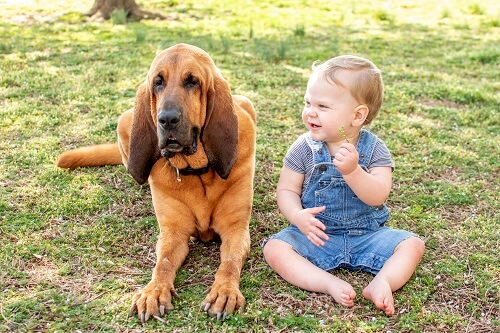
Standing just over two feet tall and weighing up to 105 pounds or more, Bloodhounds make our list as the number two dog on our list. Though these guys look sleepy and lazy, they require a lot of exercise, and long walks on a sturdy leash are necessary. Walking with them off-leash is not advisable. These are hunting dogs, and once their nose picks up a scent, they can be off for the hunt.
Bloodhounds drool quite a bit. Bloodhounds do well in a large fenced yard, but they like to dig so the fence must be a secure one. Their faces are distinctive to everyone, with their sad eyes and baggy skin. Striking up a conversation with someone new is easy to do once they get a look at your pet’s face.
Bloodhounds are very mellow, which is why we put them so high on our list of best dog breeds for seniors. This probably is not the best choice if you are looking for a hiking buddy. However, if your heart desires a super sweet, adorable companion, then Bloodhounds are the right dog for you!
1. Papillion
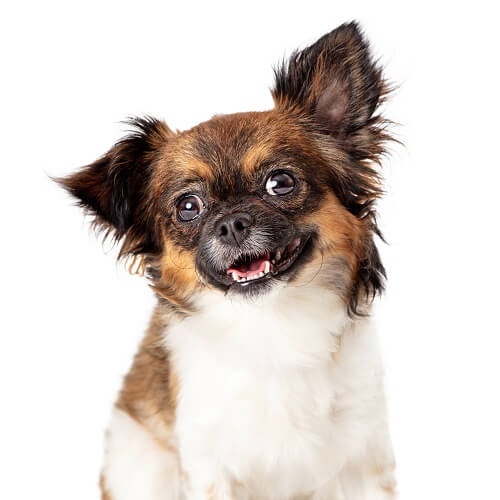
Papillion makes our list as the number one dog for seniors. These playful dogs are really cute and really small. They have oversized ears, which grow long poofy hair, as does their neck and shoulders. They are highly intelligent and easily trainable. Although they have high energy and demand a lot of walking, they are also great dogs for small homes or apartments, as they know how to chill. In a nutshell, Papillon dogs are great for people who want a small, low-shedding, non-allergenic companion.
Papillion is a French word meaning "butterfly." Papillion dogs are known for their distinctive butterfly-like ears and webbed feet, hence the name.
If you have grandchildren, you don't need to worry about the little ones playing with these fur balls if you have grandchildren. Papillions are super kid-friendly. Your little pups are sure to keep you in good shape and your spirits high.
Worst Dog Breeds for Seniors
Border Collie
Border Collies are very intelligent, loyal, and energetic dogs. They have a strong instinct to chase animals that move fast because they were originally raised on farms where they helped with chores like rounding up livestock or protecting them from predators like coyotes or bears. The dogs have a natural instinct to nip at the heels of the sheep when they get too close to each other or stray from their flock. Unfortunately, for seniors with small grandchildren running around in the backyard or park, nipping at the heels can often be dangerous and scare the child. The last thing you want is your grandchild scared of dogs because of your choice in breed!
Additionally, Border Collies are sometimes called "workaholics" because of their stamina. Border Collies need lots of physical activity, or they can become destructive or neurotic. Most seniors want a companion pup that forces them to take daily walks, but not the amount of exercise a Border Collie requires. Thus, we do not recommend Border Collies for boomers and seniors.
Basenji Dog
Basenjis are a breed of dog from Africa first seen in the Congo Basin and Central Africa. It is believed Besenjis were domesticated over 2,500 years ago by tribes in the area, who used them as hunting dogs and guard dogs. Basenjis are known for their howling bark, which can often be quite obnoxious, especially to seniors who simply want to kick back and relax in retirement.
Although these dogs are very loyal, intelligent, and beautiful in appearance, we would not recommend them for seniors.
Dachshund
A dachshund is a dog bred to hunt badgers and other small animals in holes or burrows. They have short legs and long bodies, which makes them very fast runners. Dachshunds can be good with children when raised around them from a young age. That being said, there is no guarantee your grandchild is safe with a Dachshund. After all, children love to pull ears and play with their tail, which can risk being nipped or bitten by a Dachshund. For this reason, we do not recommend Dachshunds for seniors, especially those with grandchildren.
Jack Russel Terrier
The Jack Russel Terrier is a small, compact and lively dog. It has a broad skull and muzzle with a black nose. Its ears are erect, pointed, and set high on the head. The tail usually curls over the back or hangs down.
The Jack Russel Terrier is an intelligent dog that can be easily trained to obey commands. It is also very friendly to children but should be supervised around other dogs and cats due to its hunting instincts. This can be a problem for seniors who have other pets.
Also, Jack Russel Terriers are very hyper, which is not ideal for seniors, especially those with limited mobility or simply trying to relax in retirement. The last thing you need is your pup driving you up a wall during much-needed downtime in your golden years.
Pit Bull
The term “pit bull” is a generic term for several breeds of dog, such as the American Pit Bull Terrier, American Staffordshire Terrier, and Staffordshire Bull Terrier. These dogs are known for their strength and agility. Pit Bulls are a breed of dog that has been bred for fighting. Pit Bulls were originally bred from bulldogs in England and Ireland but were developed in America.
When raised as pups in a friendly, loving environment, Pit Bulls are quite friendly and no more likely to attack than other breeds. Unfortunately, when they do attack, it can be deadly due to their jaw strength and natural breeding for fighting. Thus, it is not only unsafe for your grandchildren to play with a Pit Bull but also for friends who visit your home. We do not recommend Pit Bulls for boomers and seniors.
Best Lap Dogs For Seniors
The best lap dog breeds are ones that are small and love to be cuddled. These breeds are perfect for people who don't have a lot of space but still want a pet they can snuggle up with.
There are many benefits for seniors owning a lap dog. They provide unconditional love, are protective, and make you happy. Dogs are also great for your health. They provide companionship and help lower blood pressure.
The best lap dog breeds are dogs that can be comfortable on a couch or chair with you while still being small enough to carry around the house or apartment. That is why some of the best lap dog breeds for seniors include Pugs and Beagles.
Pugs are very small, weighing only 11 pounds and standing 8 inches tall at the shoulder. This breed is very affectionate and loves to curl up on laps and cuddle in bed with its owners at night.
Beagles are an energetic breed that loves to run around but also snuggle with their owner. They are easy-going and friendly. They are also great with children, so seniors don’t have to worry about the dog sitting on their grandchild’s lap.
Dog Owner Checklist Before Purchasing
-
How much exercise does the dog require?
-
How much hair does the dog shed?.
-
Do you have a yard for Fido to use as their bathroom?
-
Will you mind it if they do not wipe their paws after being outside?
-
Do you have the strength and energy to walk or run the pooch?
-
Can you bend down and clean up after them, at home or in public?
-
Are you willing to be home enough during the day to take care of them?
-
Can you afford their medical care?
-
Can you afford to feed them?
-
Do they have long tails which might get underneath our rocking chairs?
-
What kind of disposition does the dog breed generally have?
-
Are they small enough to trip over, or large enough to pull us over?
-
If you garden in your backyard, will you forgive the dog’s digging in the garden?
Those are just some primary considerations before considering bringing Fido or Fifi or Rex or King or Charlie the Chihuahua into your home and life. The upside of having a pet around often far outweighs the added work that they require.
Upsides to Having a Dog at Home
-
They can be great companions.• How much hair does the dog shed?
-
They can be an added level of physical security at home.
-
Dogs are wonderful conversation-starters with people when we take them for a walk.
-
Dog owners generally are open to talking with other dog owners when we meet them.
-
Having a pet provides us with another purpose and reason to carry on with living.
-
Dogs greet us at the door enthusiastically, even if we have been out for a minute.
-
Dogs clean up the food we drop on the floor while cooking.
-
Dogs provide lots of exercise and increase overall health
Written by Ainbinder - bio on our Editorial Team.

